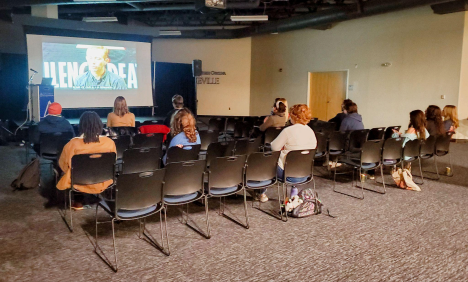International students at UNC Asheville said they struggle due to the language barrier.
“Communication is very difficult. It’s so hard for me to keep up,” said Rinta Takagi, a Japanese sophomore student at UNCA.
Takagi said he finds studying in an English-speaking country more difficult than studying in Japan.
“In Japan, my results would be better, because my first language is Japanese and I can understand all of what the teachers say,” Takagi said.
Takagi said since English is his second language, he receives support from some of his professors.
“Some teachers help me by speaking slower or teaching me twice. Body language helps me as well,” Takagi said.
Charles Lee, lecturer of French and Spanish at UNCA said he doesn’t know what support English as a second language students receive because no plans exist to improve the support for these students.
“I don’t have specific information on future plans for improving support for students where English is their second language,” said Sara King, study abroad coordinator and international student adviser at UNCA.
King said support for English as a second language students continues to develop but issues persist.
“The enhancement of support services for students for whom English is a second language has been a growing focus for many educational institutions. While progress has been made in recognizing and addressing the needs of these students, challenges may still exist,” King said.
The study abroad coordinator and international student adviser at UNCA said a need exists for more focus put on English as a second language students.
“A balance is needed between recognizing the unique challenges faced by these students and fostering an environment that encourages skill development and independence,” King said.
Lee said he has experience in studying in another country that didn’t speak his mother tongue, and he found it difficult.
“It’s certainly very challenging. Even if you have high competency it takes a lot more effort physically to listen actively,” Lee said.
Scholarly studies from the American Academy of Neurology and Cell Press say that bilingualism benefits an individual’s cognitive ability and health.
Bilingualism provides benefits to individuals from young infants to older adults facing cognitive decline, according to a scholarly Cell Press study.
Bilinguals reported a clear advantage regardless of the age at which they became bilingual, according to the American Neurological Association. This finding comes from studies comparing bilingual and monolingual groups, using over 1,000 individuals who took an intelligence test at age 11 and then tested again in their 70s.
According to the American Academy of Neurology, bilingualism leads to health benefits.
Research on bilingualism has already documented a delay of four to five years in the onset of Alzheimer’s symptoms for bilinguals relative to age and education matched monolinguals. No known pharmaceutical agent has any effect that comes close to bilingualism, according to the American Academy of Neurology.
The French and Spanish lecturer said he experienced the benefits of bilingualism since his career in literary and academic translation began in 2014.
“Every job I’ve ever had, my languages have been either relevant to the job or helped me get the job I otherwise wasn’t the best candidate for. It’s helped me negotiate higher salaries, so very concretely it’s been beneficial to my career,” Lee said.
Lee said the flexibility of bilingualism benefits other people’s careers.
“A person that only speaks one language, the places they could study, or work are always going to be limited by that, whereas if you have more than one, all kinds of new horizons open up for you,” Lee said.


![Brooke Pedersen [second from the right] and Luis Reyes [right] hold banners during the Wrap The Woods event.](https://thebluebanner.net/wp-content/uploads/2025/09/ELIZABETH_PRITCHITT_IMG_3470-1200x804.jpg)




















